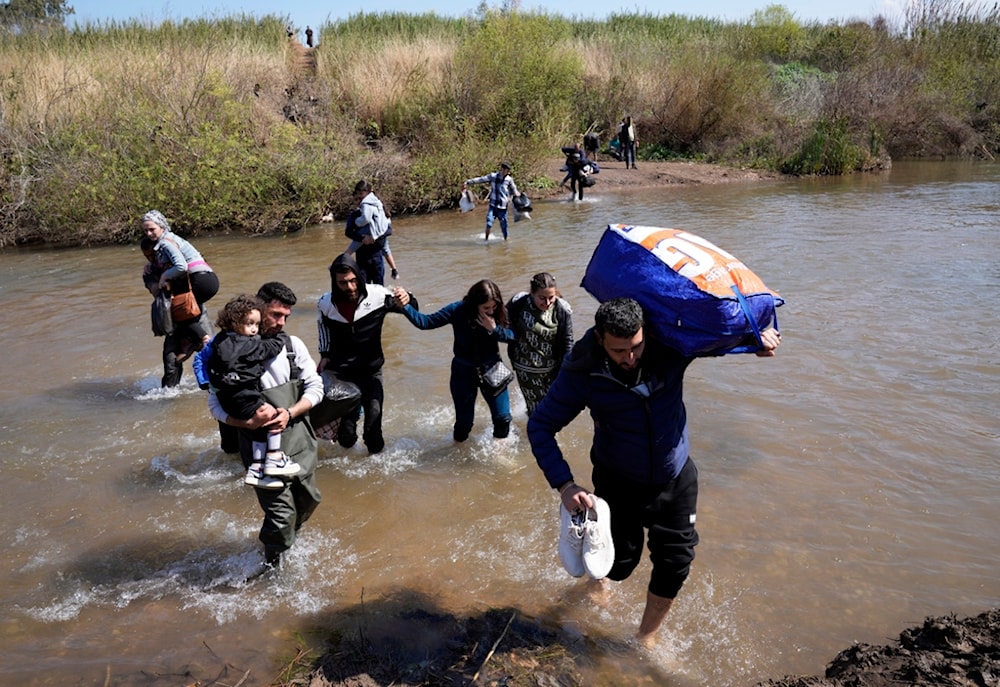UNSC condemns violence in Syria, urges minorities protection
Russia warned against the rise of terrorism in Syria and compared the killings of minorities to Rwanda's genocide.
-
 Syrian families who fled the clashes in Syria hold their luggage as they cross a river marking the border between Syria and northern Lebanon near the village of Heker al-Daher in Akkar province, Lebanon, Tuesday, March 11, 2025 (AP)
Syrian families who fled the clashes in Syria hold their luggage as they cross a river marking the border between Syria and northern Lebanon near the village of Heker al-Daher in Akkar province, Lebanon, Tuesday, March 11, 2025 (AP)
The UN Security Council denounced recent civilian murders in Syria and encouraged the country's transitional regime to respect all people, regardless of religion or nationality.
In a statement, the council denounced significant violence in western Syria since March 6, including "mass killings of civilians," notably among the Alawite community.
The Syrian Observatory for Human Rights (SOHR) recorded the killing of 1,383 civilians, mostly Alawite Syrians, in the past weeks. The SOHR said the majority of civilians killed were executed by personnel affiliated with the Syrian Defense Ministry or the Internal Security Force.
The observatory reported that the citizens were slain in "executions by security forces and allied groups" after the unrest erupted last week in the coastal stronghold of the Alawite community, to whom former Syrian President Bashar al-Assad happens to belong.
The UN Security Council expressed in a post on X its "grave concern over the impact of this violence on escalating tensions among communities in Syria and calls on all parties to immediately cease all violence and inflammatory activities and to ensure that all civilians, civilian infrastructure and humanitarian operations are protected."
"The Security Council calls on the interim authorities to protect all Syrians, regardless of ethnicity or religion," the statement read.
Meanwhile, the UN Syria Commission of Inquiry urged maximum restraint and adherence to international law obligations regarding the protection of civilians amid reports of escalating violence in Syria targeting minorities.
In a post on X, the commission demanded the humane treatment of all who have laid down their arms and said it welcomed all statements to this end.
Amid reports of escalating violence, @UNCoISyria urges maximum restraint and adherence to international law obligations regarding the protection of civilians and humane treatment of all who have laid down their arms, welcomes the statements to that effect. pic.twitter.com/7CNq33OLYy
— UN Syria Commission of Inquiry (@UNCoISyria) March 8, 2025
Russia denounced Syria's new leadership in a closed United Nations Security Council (UNSC) briefing this week, Reuters reported, citing two sources briefed on the meeting.
Russia warned against the rise of terrorism in Syria and compared the killings to Rwanda's genocide, the news agency reported. Moscow said the execution of hundreds of Syrians drew similarities to the 1994 genocide in the African country, where Tutsis and Hutus were killed by extremists from the Hutu tribe.
"I say what I want in the closed consultations, based on the premise that it is closed consultations and nothing comes out," Nebenzia said when asked about whether he made the comparison at the meeting.
Syria on path to fragmentation, al-Sharaa has limited time to act: FT
The violence that erupted in Syria’s coastal cities is a troubling indication of the country’s potential fragmentation along sectarian lines, suggested John Sawers, the former head of the UK’s foreign intelligence service (MI6), in an opinion piece published in the Financial Times.
Sawers stressed that sectarian violence serves as a "wake-up call" for Syria’s interim president, Ahmad al-Sharaa, adding that his promise to form an inclusive government "has so far proved largely empty."
He further asserted that al-Sharaa had self-appointed himself to power, noting that he focused on consolidating authority for himself and the narrow bloc he led during last month’s National Dialogue conference in Damascus, which was attended by "other opposition groups."
The report reminded that Hay'at Tahrir al-Sham (HTS), led by al-Sharaa, emerged from al-Qaeda’s Syrian branch, highlighting that the interim president and his armed followers "are still rooted in a brand of Salafist Islamism that is unpopular even within the majority Sunni community."
Sawers pointed out that al-Sharaa appointed his HTS aides to senior positions in the new military after dissolving the former Syrian Aab Army and police force, arguing that he had repeated "the painful mistakes the Americans made in Iraq after the fall of Saddam Hussein’s regime."
The former MI6 chief emphasized the need for al-Sharaa to act swiftly to demonstrate his commitment to building an inclusive Syria, warning that "trying to re-establish autocratic power in such a diverse country is a recipe for violent resistance."

 4 Min Read
4 Min Read








